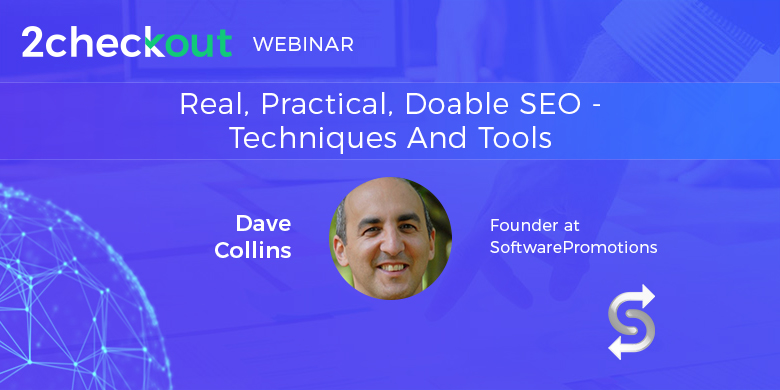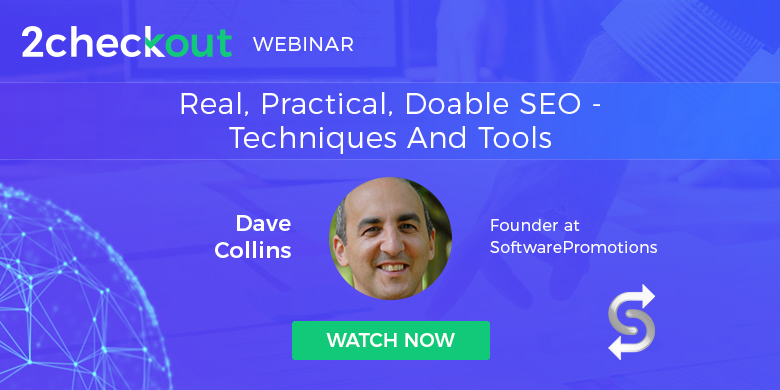Any thriving online business knows the importance of effective SEO as a long-term effort that is essential to success, but in reality, it can often feel overwhelming with too many risks and uncertainties.
I recently had the pleasure to share my “effective, quick and easy” formula for approaching search engine optimization projects in the “Real, Practical, and Doable SEO” webinar hosted by 2Checkout. The event gave me the opportunity to address so-called industry secrets in the field, share some of my own effective best practices, while also tackling attendants’ questions on their SEO pain points, such as: What are the most important ranking factors for Google? Why is that other business’ website ranking higher than ours? What are the best tools to monitor and optimize SEO performance?
Bonus: Here’s a list of some of the best SEO tools to help you optimize your website and improve rankings!
We began by looking at the often-overlooked fundamentals of SEO, one of which is the real secret of SEO – that Google does need our help. While a customer might search for a product like yours, if their search keyword combinations are complicated, or even different from what you think they might search for, they may have problems finding you. Therefore, it’s important that your content sends the right signals to Google, so they can lead your customers to you. Google’s organic results are generated by a system, which can, of course, be steered and optimized, as explained during the webinar.
Nice theory, but how do you actually do this? Make it crystal clear what your content is, who your ideal customers are, and why your content is better than your competitors’, using the best tools to measure, analyse, and optimize that content.
And with all the SEO tools out there, how to choose? We had time to look at some of the industry’s leading tools during the webinar, but my recommendations went out primarily for three of these, tools that can actually make a difference to how much traffic you get from Google.
1. Google Search Console provides a plethora of invaluable tools and statistics. One can customise and compare by time period, query type, devices used by searchers, etc. Google Search Console is amazing – make it your new friend, and spend a little time getting to know each other.
- Performance – Have a look at the date range and compare functions. Try looking at only one single metric (like clicks) to see which terms (or pages) have fallen.
- URL inspection – Drop in a URL for one of your pages. See when it was last indexed and where from. Check the canonical and mobile friendliness.
- Coverage – Check on your errors and issues, but don’t panic! Most websites have many errors, and some may be of little importance.
- Sitemaps – Make sure they’re in there and error-free.
- Mobile Usability – You may well have errors but how important are those pages? Dig deeper if required.
2. Desktop Crawlers can provide critical information on your own content as well as that of your competitors, helpfully ranking issues they identify as High, Medium or Low Priority, with comprehensive reports to guide your strategies. Two solutions I recommend here:
- Sitebulb – This is an insanely useful desktop crawler, for Windows and Mac. It does an incredible job of hand-holding and prioritizing. A great tool for someone wanting to put together an SEO plan.
- Screaming Frog – This is similar to sitebulb, but more technical, and not as user-friendly. Very little by the way of guidance, but for the person who knows what they’re doing, it’s invaluable.
3. An SEO tool called Ahrefs is the most powerful, comprehensive and downright incredible online SEO tool that exists today. Keyword research, content analysis, link opportunities, and rank-tracking are among its many features. It is the quickest and easiest way I know to reverse-engineer your competition.
The webinar also gave us the chance to dive into useful ways to use Chrome, and gifts from Google:
- PageSpeed Insights – Provides detailed page speed ratings with actionable recommendations.
- Mobile-Friendly test – Lets Google rate your webpage for its ease of use and accessibility.
- Google Trends – Records and tallies the number of searches over time.
- Google Alerts – Google keeps an eye on what’s important to you.
If you’re curious about the other recommendations I shared throughout this webinar, or if you want to learn more about how to make SEO an easy part of your business priorities, I invite you to view the full webinar here.






